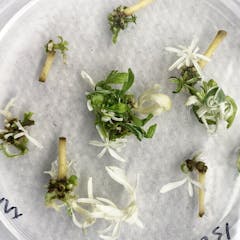
Articles on CRISPR/Cas9
Displaying 21 - 40 of 69 articles

Pesticides have become almost essential for agriculture, but their misuse can have negative effects on crops too.

CRISPR gene editing should learn from the Slow Food movement. Scientists must allow time for critical conversations and perfecting of techniques before rewriting the source code of humanity.

Four months ago a researcher claimed he had used the tool CRISPR to edit the genomes of twin girls. Now prominent researchers and ethicists are calling for a temporary halt to this sort of work.

Despite the fact that rare diseases aren’t actually so rare, it appears they suffer from a branding problem in Canada.

When geneticists create mice with special traits, there is no way to be sure that they will be inherited by the offspring. But a new genetic tool called a gene drive may fix the problem.

Gene editing through CRISPR may have greater consequences than climate change or unleashing the energy of the atom.

To announce the world’s first gene-edited babies, scientist He Jiankui did what movie directors do: release a trailer on YouTube. The video is a positive spin on unauthorized gene editing.

Chinese researcher He Jiankui told a spellbound audience how he created gene-edited babies. With a couple of revealing slides, we can see what he did and speculate what health problems might ensue.

Chinese researcher, Jainkui He claims to have created the world’s first genome-edited twins. Such action would pose unknown risks to the lives of these children and to humanity as a whole.

The announcement of the birth of babies with edited genes has been met by a deluge of scientific and ethical criticism. Public discussion focuses on risks and benefits – was breaking this taboo worth it?

A Chinese scientist has revealed he edited the DNA of twin girls born through in vitro fertilization. These girls are designed to be resistant to HIV. Is the edit a medical necessity or an enhancement?

We don’t know anything about the health of the baby girls who are reported to have been born. But it’s clear scientists around the world are shocked.

China is pushing hard to lead a genome editing race.

It has taken hundreds, if not thousands, of years to create the juicy, shiny produce that you take for granted at the supermarket. But now there is a faster way to domesticate wild fruits and veggies.

Academics from different disciplines come Head to Head in this series to tackle topical debates.

Basic research can be easy to mock as pointless and wasteful of resources. But it’s very often the foundation for future innovation – even in ways the original scientists couldn’t have imagined.

CRISPR has been hailed as the an editing tool that can delete inherited mutations and cure disease. But recent papers suggest that the technique may be too dangerous for use in human therapies.

A new study found the Cas9 gene editing scissors don’t stop cutting after we tell them to.

GMO crops have been rejected by many countries and consumers. Now, an international team of researchers are creating better crops using DNA editing–without inserting foreign genes into the plant.

A bit of advice for any criminals inspired to try and edit their own genes – it’s unlikely to work, and it may present health risks.





